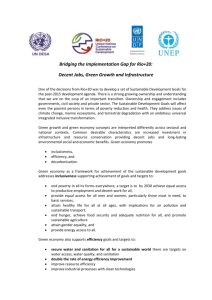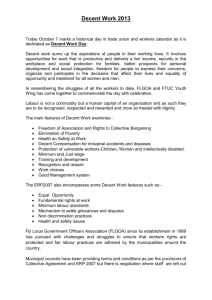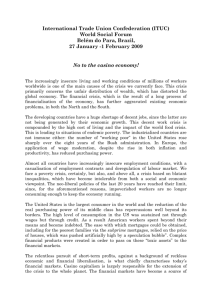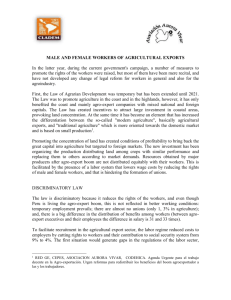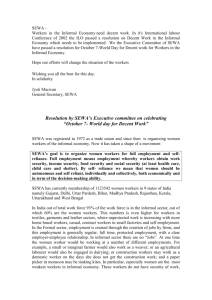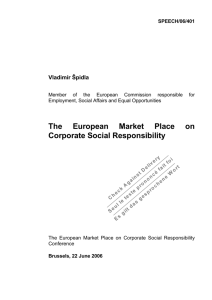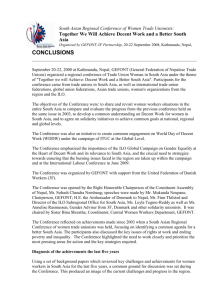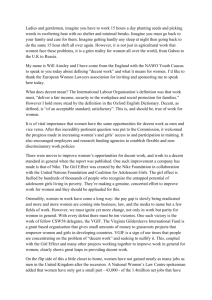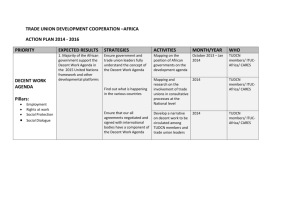Notes from the English-speaking Working Group on the presentations
advertisement
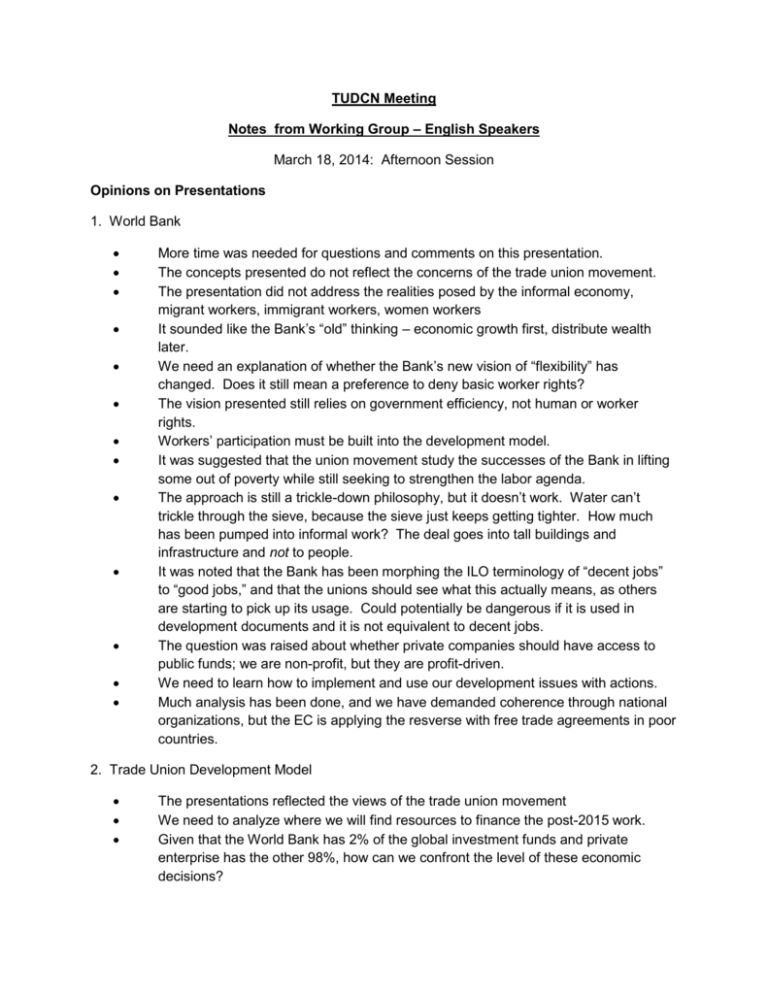
TUDCN Meeting Notes from Working Group – English Speakers March 18, 2014: Afternoon Session Opinions on Presentations 1. World Bank More time was needed for questions and comments on this presentation. The concepts presented do not reflect the concerns of the trade union movement. The presentation did not address the realities posed by the informal economy, migrant workers, immigrant workers, women workers It sounded like the Bank’s “old” thinking – economic growth first, distribute wealth later. We need an explanation of whether the Bank’s new vision of “flexibility” has changed. Does it still mean a preference to deny basic worker rights? The vision presented still relies on government efficiency, not human or worker rights. Workers’ participation must be built into the development model. It was suggested that the union movement study the successes of the Bank in lifting some out of poverty while still seeking to strengthen the labor agenda. The approach is still a trickle-down philosophy, but it doesn’t work. Water can’t trickle through the sieve, because the sieve just keeps getting tighter. How much has been pumped into informal work? The deal goes into tall buildings and infrastructure and not to people. It was noted that the Bank has been morphing the ILO terminology of “decent jobs” to “good jobs,” and that the unions should see what this actually means, as others are starting to pick up its usage. Could potentially be dangerous if it is used in development documents and it is not equivalent to decent jobs. The question was raised about whether private companies should have access to public funds; we are non-profit, but they are profit-driven. We need to learn how to implement and use our development issues with actions. Much analysis has been done, and we have demanded coherence through national organizations, but the EC is applying the resverse with free trade agreements in poor countries. 2. Trade Union Development Model The presentations reflected the views of the trade union movement We need to analyze where we will find resources to finance the post-2015 work. Given that the World Bank has 2% of the global investment funds and private enterprise has the other 98%, how can we confront the level of these economic decisions? Elements of the Trade Union Development Model In some places there are too many trade union federations, weakening the overall power of the trade union movement. In these cases, efforts should be made to bring the unions together to build sufficient power to confront the multinational companies. Trade unions must build greater strength and capacity and take united actions to counter multinational power. More equitable distribution of wealth – sustainable economic growth as well as equality. Do we have data showing that the equitable distribution of wealth contributes to sustainable economic growth – to use in our arguments at the national level? Development model must lead to decent work, be based on decent work. [It was noted how economic growth cited by the banks is not always broadly based. For example a celebrated 14% wage hike in India applied only to a small minority of people, and not to the huge majority, which labored in the informal sector.] Articulate components of decent work to ensure that all parties are clear on its elements and can be held to them in commitments where they appear. Social dialogue, social protection, trade union power. Collective bargaining rights are an essential aspect. Peace and stability (noting the impossibility of advancing development in conflict and war-torn zones). Promotion of employment, including skills development, technology, financing (cooperatives), free, quality education. Migrant workers must have the same rights as other workers (full labor protection for all workers). Eliminate unfair labor practices Social security Rehabilitation of the role of public services, health, education Pursue regional union blocs to create conditions to respond to multinational investors; create more global alliances. Encourage locally-based development to become less dependent on foreign investment Trade unions should counter Bank policies by writing and promoting alternative policies…policies that ensure inclusive growth and strengthen the role of governments over companies. Before heading into the post-2015 agenda, measure the extent to which the existing goals have been met (and how). Education for everyone, growth of local companies, social security, social justice. Since the MDGs have not been achieved, the post-2015 goals should also include the MDGs. Social protection should be a dedicated stand-alone goal, to prevent it from being lost in related issues, sidelined, or ignored. Need specific commitment to universal social protection, through the creation and implementation of social protection floors. Gender equality, human rights Do we have proof of engagement to show results? How do documents and processes connect?

